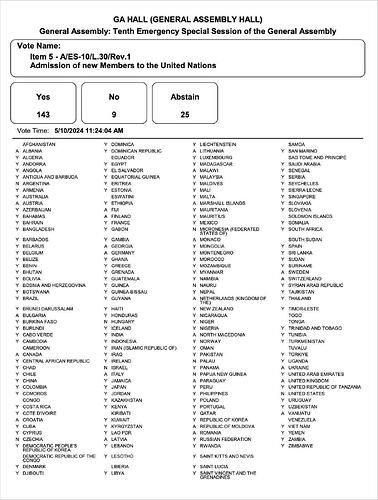Maybe it’s part of getting older, but it feels as if international diplomacy and the school playground have never been closer.
Scum
All quite clearly Hamas.
Malta ![]() Slovenia
Slovenia ![]() Ireland
Ireland ![]() and Spain
and Spain ![]() are proceeding with their plan to recognize Palestine
are proceeding with their plan to recognize Palestine ![]() too. Is there any significance of their June timeline?
too. Is there any significance of their June timeline?
Seriously, these guys now need to be locked-up.
Hoping and praying that the UN can overcome the cuntish obstacles USA throws out there is like hoping and praying that the Premier League can carry through with their charges against the cuntish army of City lawyers.
Just pushing the US into the corner because of their indefensible stance.
FIFY
Three Israeli whistleblowers working at the Sde Teiman desert camp, a holding site for Palestinians detained during Israel’s invasion of Gaza, have claimed to have witnessed a series of abuses by the military, including prisoners being restrained, blindfolded, and forced to wear diapers, reports CNN.
The Israeli whistleblowers said of the prisoners:
We were told they were not allowed to move. They should sit upright. They’re not allowed to talk. Not allowed to peek under their blindfold.
According to the sources, guards were instructed to enforce silence by shouting “uskot” (Arabic for “shut up”) and to identify and punish problematic individuals.
The witnesses told CNN the facility, some 18 miles from the Gaza frontier, is split into two parts: enclosures where around 70 Palestinian detainees from Gaza are placed under extreme physical restraint, and a field hospital “where injured detainees are immobilised, diapered, and fed through straws”.
According to the whistleblowers, the beatings were retaliatory in nature and not intended for intelligence gathering. “They were done out of revenge. It was punishment for what they [Hamas] did on October 7 and punishment for behaviour in the camp.”
One whistleblower described “a routine search when the guards would unleash large dogs on sleeping detainees, lobbing a sound grenade at the enclosure as troops barged in”.
Following the attack on Israel by Hamas on October 7, the Israeli military converted three military sites into detention camps for Palestinian prisoners from Gaza. This move aligns with Israel’s Unlawful Combatants Law, which was expanded by the Knesset in December to grant the military greater detention powers.
Responding to CNN’s request for comment on all the allegations, the Israeli military, said in a statement:
The IDF ensures proper conduct towards the detainees in custody. Any allegation of misconduct by IDF soldiers is examined and dealt with accordingly. In appropriate cases, MPCID (Military Police Criminal Investigation’s Division) investigations are opened when there is suspicion of misconduct justifying such action.
Detainees are handcuffed based on their risk level and health status. Incidents of unlawful handcuffing are not known to the authorities.
Just putting this here. Not exactly important news, but…
https://twitter.com/manniefabian/status/1788882402426634654
UN passed resolution for UN Security Council to reconsider and support Palestine membership into the UN
The UN general assembly overwhelmingly passed the resolution for the UN Security Council to reconsider and support the full membership of Palestine into the United Nations.
143 countries supported it, 9 voted against, and 25 abstained.
Will be telling who’s voted against or abstained.
Given the sense of proportionality that IDF displays, I expect wasp nests to be nuked as we move forward ![]()
United Kingdom abstained. Fucking wankstains.
